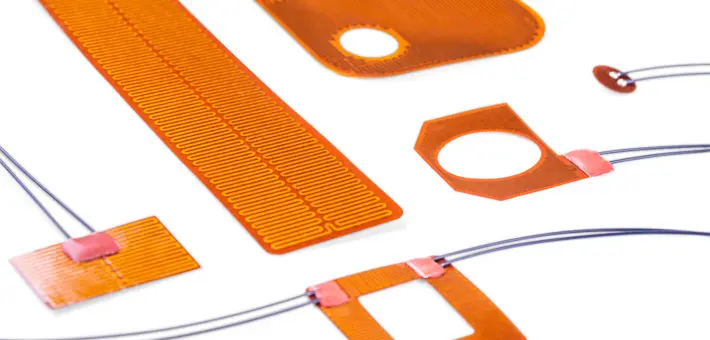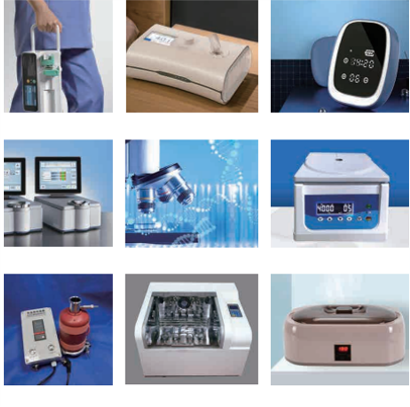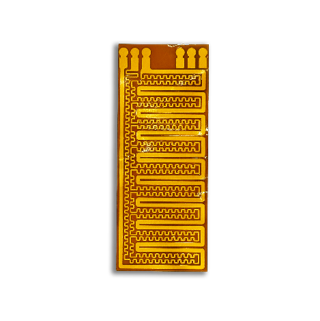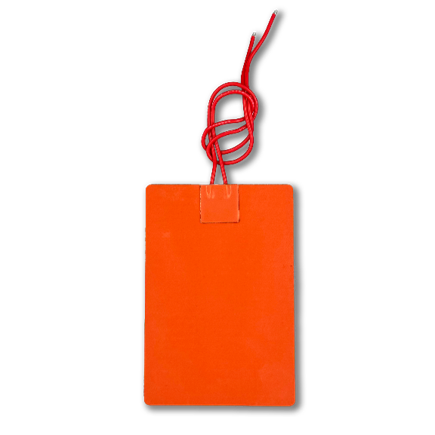Polyimide film insulated flexible heaters are widely used in advanced industries for their precise heating control and reliable performance. They combine thin construction with durability, making them suitable for sensitive electronics, aerospace equipment, and medical systems. From compact sensors to complex laboratory devices, these heaters are valued for their stability and adaptability.
At Best Technology, we provide high-quality flexible heating solutions built to global standards. Our expertise in custom polyimide film heaters allows clients to achieve consistent thermal control while benefiting from competitive pricing and strict quality traceability.
Electric polyimide film insulated flexible heaters are specialized thin film heaters made from a polyimide base. Polyimide, often recognized by the trade name Kapton, is a lightweight polymer film with exceptional thermal endurance. The film serves as both the insulation layer and the structural support for the heating circuit.
These heaters work by embedding etched foil heating elements between layers of polyimide film. When electric current flows through the foil, heat is produced and spreads evenly across the surface. Because the film is thin, heat transfer is fast and accurate. This makes them an excellent choice when uniform heating is critical.
Their flexibility allows engineers to integrate them into compact assemblies without adding bulk. Unlike rigid heaters, they conform to curved surfaces and fit into narrow spaces, enabling thermal solutions for designs that demand compactness.

Polyimide film stands out as one of the most versatile insulation materials. It resists extreme temperatures, typically from -200°C up to +200°C, without degrading. This wide range gives engineers confidence in harsh conditions.
The material is chemically stable, resisting solvents, oils, and moisture. Its mechanical strength remains intact even at high heat, making it far more reliable than many plastics. Its electrical insulation properties further add to its advantages in electronic applications.
Compared to silicone or fiberglass, polyimide is thinner, lighter, and more precise. Its low outgassing also makes it suitable for aerospace and cleanroom environments. This balance of strength, thinness, and stability is why polyimide is often regarded as the best choice for heat insulation in advanced industries.
Thin film heaters such as polyimide film insulated designs are applied across many fields. In medical technology, they keep diagnostic instruments at stable temperatures for accurate readings. They are also used in blood analyzers, surgical tools, and handheld diagnostic devices and so on.

Flexible heater manufacturers often tailor designs to match customer requirements. The process begins with defining the shape, voltage, watt density, and operating temperature range. Since polyimide heaters can be etched into almost any geometry, they adapt to unique product designs with ease.
Manufacturers also select adhesives and laminates that suit the operating environment. For instance, aerospace clients may request low outgassing materials, while medical customers may focus on biocompatibility.
Before shipment, heaters undergo testing for resistance, dielectric strength, and thermal performance. Leading manufacturers integrate MES systems to track every batch, ensuring traceability from raw materials to final delivery. This level of precision separates trusted suppliers from low-cost alternatives.
The price of polyimide film insulated flexible heaters depends on several factors. Custom shapes or high-density heating patterns require advanced etching processes, which increase production costs.
Material selection also influences pricing. Higher-grade polyimide films and premium adhesives come at a higher cost but extend service life. Order quantity matters too—large production runs benefit from economies of scale.
Although initial costs may be higher than silicone heaters, their durability and reliability reduce long-term expenses. In critical applications where accuracy and stability are vital, these heaters provide cost-effective performance over their lifetime.
Polyimide and silicone heaters are both popular, but they serve different needs. Polyimide heaters are ultra-thin, often less than 0.2 mm, and provide superior precision. They excel in tight spaces where weight and accuracy are priorities.
Silicone heaters, on the other hand, are thicker and more robust. They can operate at higher maximum temperatures and withstand more mechanical stress. However, they are less flexible in ultra-compact assemblies.
For electronics, aerospace, and medical instruments, polyimide heaters are preferred due to their thin profile and accuracy. For heavy-duty equipment, industrial machines, or environments with rough handling, silicone heaters may be the better choice.


Precision devices demand stability, and polyimide thin film heaters deliver it. Their thin structure enables rapid thermal response, which is essential for delicate sensors and measurement tools.
They distribute heat evenly across their surface, preventing hotspots that could damage components. Their lightweight construction does not interfere with sensitive instruments, making them ideal for portable or miniaturized designs.
In optical equipment, they prevent fogging and condensation. In battery systems, they regulate temperature to enhance efficiency and lifespan. Their accuracy and clean operation have made them a cornerstone in industries where every detail matters.
When selecting a partner for polyimide film insulated flexible heaters, expertise and reliability matter. Best Technology provides custom heater solutions tailored to demanding industries such as aerospace, medical, and electronics.
We hold certifications including ISO9001, ISO13485, reflecting our dedication to quality across different sectors. Every heater is produced under strict process control, with MES systems ensuring full traceability of materials.
Clients benefit from competitive pricing, professional engineering support, and consistent delivery. With our experience in flexible polyimide heaters, we help companies achieve reliable thermal management that supports innovation and long-term performance.
1. What is the typical operating temperature of polyimide film insulated flexible heaters?
They usually operate from -40°C to +200°C, offering stable performance in extreme conditions.
2. Are polyimide thin film heaters suitable for medical devices?
Yes, they are widely used in diagnostics and surgical equipment due to their stability and clean operation.
3. Do polyimide heaters cost more than silicone heaters?
Yes, but their accuracy and thin design provide cost benefits in applications where precision is critical.
4. Can flexible heaters be customized in shape and size?
Absolutely. They can be designed to match irregular surfaces, curved shapes, or compact layouts.
5. How do I select the right flexible heater for my project?
It depends on your application. If precision, thinness, and low weight are priorities, polyimide heaters are ideal. For rugged, high-power needs, silicone heaters may be better.
Simply drop your email or phone number in the contact form, and we'll promptly reply you shortly.